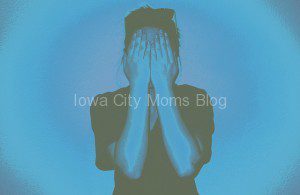I’ve always been a worrier.
In fact, my worrywart tendencies are something of a joke in our family. My ability to predict what could go wrong in any situation has earned me various nicknames: “Eeyore,” “Debbie Downer,” and my personal favorite, “Sad Trombone.”
Usually I’ve been able to keep my anxiety in check, but things took a turn for the worse after my son was born last year.
I was overly concerned with his health and safety from the moment he was born. I was terrified something awful was going to happen to him.
Horrible frightening images would pop into my head without warning. Me falling down the stairs while carrying him. His stroller rolling through the parking lot and getting hit by a speeding car.
I saw threats to his health and safety everywhere I turned. I constantly washed my hands, his hands, and my older kids hands. I sterilized toys and pacifiers. I avoided taking him places to keep him away from germs.
Despite my fears and anxieties, I functioned well. I reveled in caring for my new baby and happily drank in every moment with him. I gradually worked up to my pre-baby activity level. I started teaching and practicing yoga again. In general, I was happy and enjoying my life.
I chalked my exaggerated fears and frightening mental images up to my naturally anxious personality and lack of sleep. Besides, I told myself, I’m too strong and tough to have a problem. I could get through it on my own, just like I always had.
I didn’t have the time to let my fears get me down. My kids needed me. I wasn’t just being strong for myself–I had to keep my chin up for them as well.
Months passed.
The fears and intrusive images kept coming after my son’s first birthday. My mood started to dip. I had more days when I was down than up.
I kept putting up a strong front, but in reality I was breaking on the inside.
Asking for and admitting I need help with anything is beyond challenging for me. Toughing things out is my way of life; I’ve always taken great pride in not being needy.
Every time I sat down to make that important phone call, something else would grab my attention. Tomorrow, I would tell myself. I’ll deal with this tomorrow.
My pride coupled with my ability to function well prevented me from reaching out when I first experienced symptoms. But since I didn’t nip my postpartum anxiety in the bud, I spiraled into a deeper depression.
When I finally did get help, I learned that my symptoms were likely triggered not only by postpartum issues, but from unresolved PTSD surrounding my miscarriages years earlier. Just like with my postpartum anxiety, I thought I could “handle” the grief after losing my pregnancies on my own.
As mothers, it’s in our nature to put ourselves on the back burner. Stripping away our most basic human needs is part of the job description. We go days without showering. We eat standing up. We’re used to being interrupted in the bathroom, and we accept that a full night of sleep is an impossible fantasy.
Even though putting our kids first is admirable, it’s crucial that we are as vigilant with our own mental and physical health as we are our children’s. Would I have allowed one of my kids to struggle as long as I had? Of course not.
In addition, one of the biggest lessons I am learning is that it’s okay to be vulnerable sometimes. Stepping into vulnerability doesn’t make you weak; in fact, reaching out when you need help is one of the most courageous things you can do for yourself.
The good news is that since I’ve gotten help the anxiety is loosening it’s grip on my spirit. I’ve learned that compassionate self-care is not an option–it’s a necessity for the health and happiness of my family.
If you think you might be suffering from a postpartum mood disorder, don’t wait to get help. Contact your healthcare provider for treatment options.
Images courtesy of Flickr users pol sifter and alexisnyal












